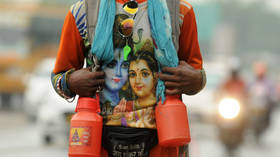India’s top court halts controversial orders seen as targeting minorities

India’s Supreme Court has suspended directives by several state governments requiring eateries along the routes of the annual Hindu Kanwar Yatra to display the names of their owners and staff. The orders sparked controversy as many of the restaurants are owned by Muslims.
The states that issued the orders – Uttar Pradesh, Uttarakhand, and Madhya Pradesh – are governed by the Hindu nationalist Bharatiya Janata Party (BJP), led by Prime Minister Narendra Modi.
BJP leaders had argued that the directive was intended to prevent confusion among pilgrims regarding food items that might violate the religious rules of the festival, which include avoiding non-vegetarian food.
The Kanwar Yatra is an annual pilgrimage when devotees of the Hindu deity Shiva collect holy water from the Ganges River at various pilgrimage sites across India.
The directives ignited a political storm. Opposition politicians, especially prominent Muslim leaders, claimed it discriminated against the minority Muslim community, which comprises around 20% of India’s population.
Asaduddin Owaisi, president of the All India Majlis-e-Ittehadul Muslimeen (AIMIM) party, condemned the move as unconstitutional, accusing the state governments of “promoting untouchability” and “discrimination against Muslims.” He also argued that it violated the constitutional right of Muslims to earn a living.
On Monday, the Supreme Court prohibited the enforcement of these directives, stating that police cannot overstep municipal authorities by issuing orders that restrict freedoms without legal backing. Justices Hrishikesh Roy and S.V.N. Bhatti noted that food stalls should display the type of food they serve, but not the identity of their owners or employees, according to the Hindustan Times. Members of the opposition, including Owaisi, have welcomed the court’s ruling.
Where India Meets Russia: Follow and share RT India on X and Instagram













